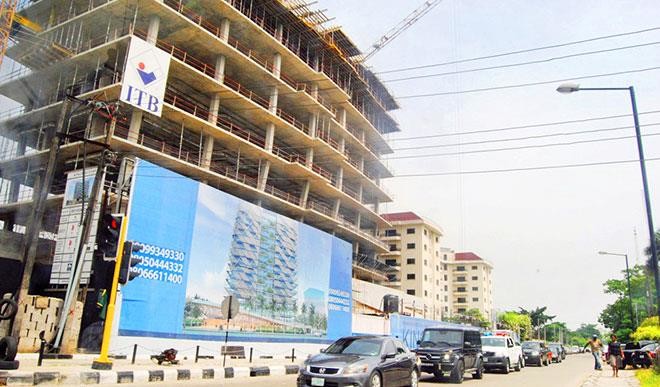The changing face of Alfred Rewane road Ikoyi
Lagos is the economic and financial capital of Nigeria and hosts most of the country’s commercial banks and financial institutions and a range of major corporate headquarters Ikoyi occupies the eastern part of Lagos Island and is linked to neighbouring Victoria Island by a bridge popularly known as the Falomo bridge. Traffic from the bride […]


Lagos is the economic and financial capital of Nigeria and hosts most of the country’s commercial banks and financial institutions and a range of major corporate headquarters Ikoyi occupies the eastern part of Lagos Island and is linked to neighbouring Victoria Island by a bridge popularly known as the Falomo bridge. Traffic from the bride empties into the now popular Alfred Rewane road, Ikoyi.
Beneath the bridge is also the popular Falomo roundabout, with the adorning Union Bank Marble House (marked No.1 Alfred Rewane road), the corporate headquarters of the Dangote Group on one side and on the opposite side the historical Church of Assumption.
In the 1940’s and 50’s, Falomo was a sleepy fishing village built on swampy land in Ikoyi. Ikoyi at that time was made up mainly of expatriates who came to run the British colonial administration.
They lived in the exclusive area with fellow expatriates who ran colonial companies like UAC, John Holt, Costain and Elder Demspter. There was only one road into Ikoyi, and this went through the cemetery, breaking up into Bank road, Bedwell, First avenue and Kingsway road, which has been renamed after Chief Alfred Rewane, even though many still choose to call it Kingsway road.
The late Rewane, an Itsekiri-born businessman and pro-democracy activist deployed his resources to fight the military to a standstill as well as provided support to National Democratic Coalition (NADECO) and related groups involved in the struggle to actualize the June 12 mandate. At a personal level, he campaigned against official graft in high places, lack of accountability and gross violation of human rights which further pitted him against the military. He was brutally killed in curious circumstances by unknown assassins in Lagos.
In early 1957, Archbishop Leo Taylor set up a building committee after acquiring land in Falomo village for a church. The church was completed within two years. On 17th May, 1960 i.e. before Nigeria’s Independence, it was dedicated and named Church of the Assumption.
Not quite long ago, the former governor of Lagos State, Babatunde Raji Fashola made a public presentation of draft final report on review of Ikoyi-Victoria Island Model City.
Fundamentally, the Ikoyi-Victoria Island Model City Plan Urban Design Principle proposes infill of vacant land with mixed-use, commercial and residential accommodations to create a mixed-use structure that combines ground floor retail space with professional offices above on the and higher density housing of between two and three storeys, surrounding a large, shared courtyard and providing private pations or roof terraces for individual dwellings.
The plan also hinted at constructing buildings along street front to define space urban corridor, including awnings or arcades to provide shaded sidewalks for passers-by and to locate parking beneath housing units with cars recessed one-half level to make land on site available for gardens and courtyards, rather than for surface parking.
Today, Alfred Rewane road has gradually transformed into a fashionable residential enclave for the upper class of Lagos as well as home to multiple tower buildings owned or occupied by exquisite hotels, multinational companies and banks.
The multi-tower structures have added elegance to the popular road renowned for the delicious Chinese cuisine at the Golden Gate Restaurant and daily live drama at the federal marriage registry where an average of 35 marriages are contracted in a day with virtually everything available for rent, from the crowd to such item as wedding gowns, bridal maids and men’s suits.
A service apartment of three-bedroom along Alfred Rewane goes for between N8 million and N15 million depending on luxury provisions within like swimming pool, gym and outdoor sporting court.
A two-bedroom goes for between N4 million and N7 million for service apartment and, N5 million for non service apartment.
Rates for the various choice hotels on Alfred Rewane are somewhat comparable to the rates in Victoria Island with rooms going for between N45,000 and N100,000 per night.
Chuka Uwuka who works with one of the organizations along the road said, “It makes no business sense to take new business to Victoria Island or Marina where access is a major challenge.
“Here, most of the hotel operators will tell you that you can access the Murtala Muhammed International Airport between 30 minutes and one hour depending on the time of the day, the same cannot be said about locations in Marina or Victoria Island.”
An economic expert said the business community in Lagos loses not less than N11 billion monthly to the daily gridlock in the city.
In a recent interview with Daily Trust, an economist, Mr Wole Sowunmi said the daily gridlock makes businessmen lose not less than N500 million daily. This translates to about N11 billion monthly.
“Estimated four hours are wasted in traffic daily by those working in Marina or on the Island. This has made transport fares to go up on many routes by 50 percent or even 100 percent in some cases,” he noted.
This, amongst other reasons, may have made Alfred Rewane road a real estate delight.
